Photographs: Reuters
State-owned oil marketing companies on Wednesday stopped jet fuel supplies to Air India in the four metros after cheques from the national carrier towards payment for fuel bounced, raising fears that the airline's flight schedules might be badly disrupted.
Public sector oil firms had in May threatened to stop jet fuel supplies to Air India after the cash-strapped national carrier repeatedly defaulted on payment of fuel bills.
Air India was put on cash-and-carry from December 2010, but the airline was not able to pay for even its daily fuel purchases.
Oil companies had in the last week of May sent a notice for stopping aviation turbine fuel supplies to Air India at some airports like Calicut and Jaipur.
. . .
Oil firms STOP fuel supply to Air India as cheques bounce
Photographs: Reuters
Air India owes Indian Oil Corporation more than Rs 1,900 crore (Rs 19 billion). IOC meets 63 per cent of Air India's jet fuel needs.
The national carrier had also run up an outstanding bill of over Rs 300 crore (Rs 3 billion) with Bharat Petroleum Corporation Ltd, while its dues to Hindustan Petroleum Corporation Ltd are relatively small.
Officials said Air India buys jet fuel worth Rs 18.5 crore (Rs 185 million) per day from the three state oil firms, but it pays only Rs 13.5 crore (Rs 135 million).
This led the oil firms to threaten to stop supplies of ATF beyond what Air India pays for.
. . .
Oil firms STOP fuel supply to Air India as cheques bounce
Photographs: Reuters
The airline has dues, including Rs. 2,300 crore (Rs 23 billion) to oil marketing companies, around Rs 800 crore (Rs 8 billion) to airport operators and Rs 400 crore (Rs 4 billion) to other vendors.
In the financial restructuring plan, Air India has proposed to issue redeemable preference shares for Rs 7,400 crore (Rs. 74 billion), of the Rs 22,165 crore (Rs 221.65 billion) working capital loans, with eight per cent dividend.
It is also considering steps to enable it to repay Rs 11,100 crore (Rs 111 billion) of loans at 11 per cent interest over a 15-year period.
Raising doubts over the government's willingness to provide timely support to cash-strapped Air India, rating agency Moody's on Monday had said that the Rs 265-crore (Rs 2.65 billion) bailout to the airline to partially clear the interest burden to banks was 'delayed and inadequate'.
. . .
Oil firms STOP fuel supply to Air India as cheques bounce
Photographs: Reuters
The government late last month released Rs 265 crore to Air India to partially clear the interest burden to banks.
The cash-strapped national carrier has interest burden of Rs 660 crore (Rs 6.6 billion) for the months of April to June.
"The bailout provides temporary relief to Air India creditors, including Indian banks, but recurring defaults by the airline imply that government support may not be timely, which is credit negative for Indian banks," said Vineet Gupta, vice president - senior analyst, Moody's Investors Service.
Air India has borrowed loans from a consortium of 22 banks led by SBI. Moody's said that amongst rated banks, State Bank of India, Punjab National Bank, Bank of Baroda, Bank of India, IDBI Bank, Central Bank of India and Oriental Bank of Commerce are large lenders to Air India and account for nearly 70 per cent of its loan exposures.
. . .
Oil firms STOP fuel supply to Air India as cheques bounce
Photographs: Reuters
Air India currently has arrears in interest and salary payments. The banks have given Air India the deadline of July 31 to pay its interest dues, failing which it will be classified as a non-performing asset.
If a company fails to pay installment (principal and interest) for three consecutive months, lenders have the right to classify the loan as a non-performing asset.
"Oil companies already incur huge losses on selling diesel, domestic LPG and kerosene way below their production cost and to expect them to sell ATF at subsidised rates is not acceptable," an official said.
At a meeting called by Cabinet secretary K M Chandrasekhar in March to resolve the payment impasse, Air India sought discounts similar to the ones given to private airlines.
. . .
Oil firms STOP fuel supply to Air India as cheques bounce
Photographs: Reuters
Oil companies give a Rs 1,600-1,800 per kilolitre discount to private airlines on promise of assured payment. After adding finance charges for a 90-day credit period, the discount comes to Rs 3,600 per kl.
"Even if this discount is stretched to Rs 5,000 per kl, the Rs 18.5 crore (Rs 185 million) per day fuel bill will not become Rs 13.5 crore (Rs 135 million)," Chandrasekhar had said.
"After including some more concessions, the fuel bill at best will come down to Rs 17 crore (Rs 170 million) a day, a far cry from the Rs 13.5 crore (Rs 135 million) paying capacity of Air India," he said.
Air India had the maximum number of flight cancellations this year, the government said on Wednesday.
. . .
Oil firms STOP fuel supply to Air India as cheques bounce
Photographs: Reuters
Civil Aviation Minister Vayalar Ravi, while responding to a written reply in Lok Sabha, however, attributed the cancellations to the pilot strike from April 27 to May 6.
He said the major cancellations, 2753, happened because "Air India had 740 and 1,848 cancellations in April and May, 2011 primarily due to pilot strike from April 27 to May 6, 2011."
The other airlines who had cancellations of their scheduled flights were Kingfisher Airlines (682), Jet Airways (540), Jetlite (381), Spicejet (351), IndiGo (89) and Go Air (84).
. . .
Oil firms STOP fuel supply to Air India as cheques bounce
Image: Civil Aviation Minister Vayalar Ravi.Photographs: Reuters
"Scheduled airlines generally operate their flights on approved schedules. However, at times the flights are cancelled due to watch hour restrictions, weather, technical reasons beyond the control of the airlines," Ravi said.
Directorate General of Civil Aviation (DGCA) has issued Civil Aviation Requirements (CAR), (an application format) which provides for compensation and facilities to the passengers in case of denied boarding, cancellations and delays.
"The CAR is available on DGCA website www.dgca.nic.in . All the airlines are providing compensation and facilities to the affected passengers in accordance applicable provisions of the CAR," he said. The carriage by air is a contractual matter between the passenger and the carrier. The complaints are filed with the airlines by the passenger. However, some passengers choose to take up the matter with DGCA, which are taken up with the airlines for redressal, he added.

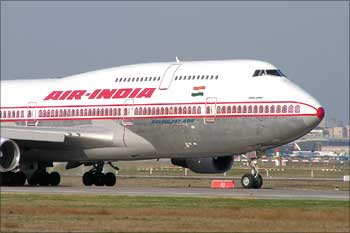
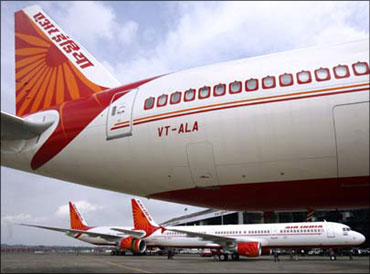
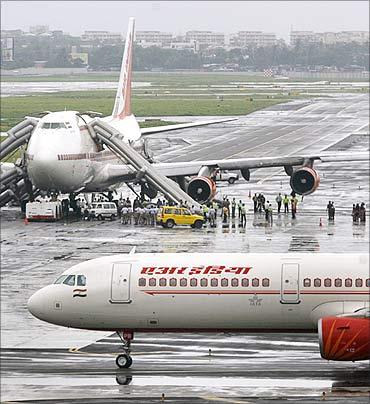
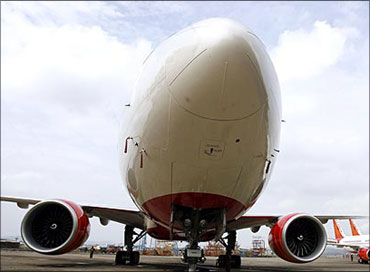
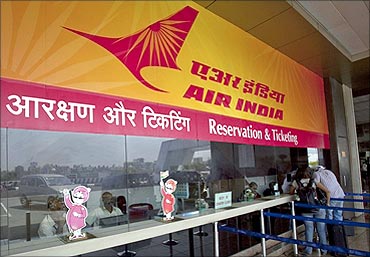
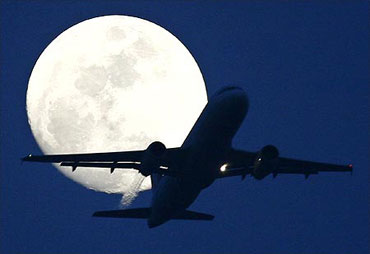
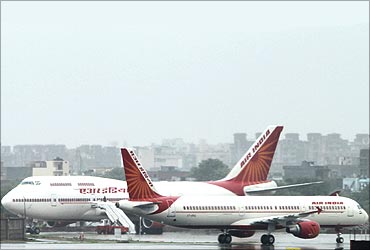
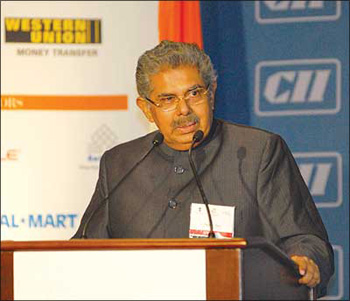
article